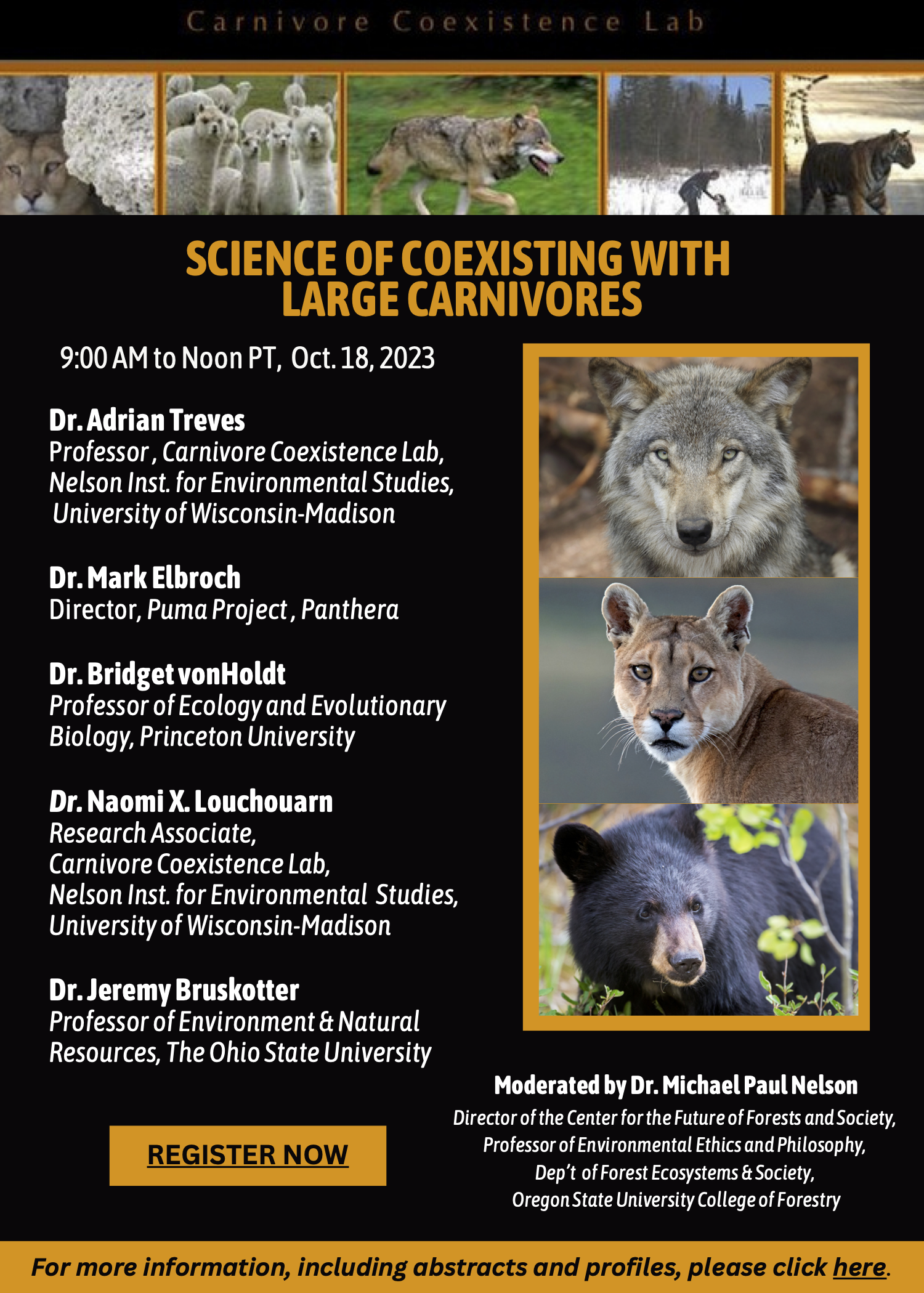
Science of coexisting with large carnivores
Expert Scientific Panel
Click here for a recording of the webinar (3 hours).
Click here to see the full Q&A of attendees with responses
(23 pages) by the panelists in the webinar, organized by speaker name.
Click here for a complete list of literature cited
during the webinar, organized by speaker name.
Several of the speakers also posted PDFs of their slides for download.
Speakers and topics
Panel 1 (first 2 hours)
Adrian Treves
Adrian focuses on ecology, scientific integrity, public trust principles, and agro-ecosystems where crops and domestic animals overlap carnivore habitat. He and his lab have authored >160 scientific articles, best known for our gold-standard experiments on non-lethal prevention of predation on domestic animals, estimates of illegal wolf-killing and cryptic poaching, and our work on risk maps to predict human-carnivore conflict sites. Founder and Director of the Carnivore Coexistence Lab, and Professor of Environmental Studies at the University of Wisconsin–Madison, he earned his PhD at Harvard University in 1997.
After the webinar, Adrian sent a letter to the Washington State commission expressing concern about breaches of scientific integrity by the Washington Department of Fish & Wildlife in the lead-up to the webinar and in its aftermath. Visit this page and look under '2023' for a copy of the letter of cocnern.
Click here for a PDF download of Adrian's presentation
L. Mark Elbroch, PhD, will speak on 'Mountain lion foraging ecology, including their impact on prey abundance'.
Mark Elbroch is the Director of the Puma (mountain lion or cougar) Program for Panthera, the global wild cat research and conservation organization. Mark has contributed to work on mountain lion ecology and conservation for 20 years..
Bridgett vonHoldt, PhD, will speak on 'Genetic insights of gray wolf population fitness'.
Dr. Bridgett vonHoldt is an Associate Professor in Ecology & Evolutionary Biology at Princeton University. She is an expert in evolutionary and population genomics of North American canids. Dr. vonHoldt is an evolutionary biologist who specializes in genomic analysis of North American canines. She joined the faculty in Princeton University’s Department of Ecology and Evolutionary Biology in 2013 and champions the value of mixed genetic ancestry for endangered species conservation. Her research focuses on molecular ecology of gray wolves and the evolutionary genomics of admixed canine species across hybrid zones, with her researching having significant conservation applications for endangered species like the red wolf. Bridgett is the founder and director of the North American Canine Ancestry Project, as well as a co-founder and lead geneticist for the Gulf Coast Canine Project.
Click here for a PDF download of Bridgett's presentation.
Panel 2 (last hour)
Naomi Louchouarn, PhD, will speak on 'The case for non-lethal methods of carnivore deterrence'.
Naomi Louchouarn recently received her PhD from the Nelson Institute and has stayed on as a lecturer teaching conservation GIS courses to Nelson Institute Master's Students. Naomi's research focuses on quantifying the effectiveness of methods to protect livestock from carnivore attacks, and how lethal control policies impact wolf poaching and survival..
Jeremy T. Bruskotter, PhD, will speak on 'Tolerance for Carnivores: Insights from Recent Research'.
Jeremy Bruskotter is a Professor in the School of Environment and Natural Resources at The Ohio State University and member of the School’s Terrestrial Wildlife Ecology (a partnership with the Ohio Division of Wildlife) and Environmental and Social Sustainability Labs where he teaches courses on conservation policy, and the psychology of environmental problems. Professor Bruskotter’s research centers on understanding and explaining how people make conservation-related judgments and decisions, and the intersection of such judgments with conservation policy. He has authored or co-authored >100 peer-reviewed articles and book chapter, which appear in top journals such as Science and leading journals in conservation and ecology (e.g., Conservation Biology, Conservation Letters, and Frontiers in Ecology and Environment). His work has also been featured in a variety of popular outlets, such as The Conversation. Professor Bruskotter’s scholarly work spans a variety of scholarly fields and disciplines (e.g., sustainability, biodiversity conservation, ecology, psychology), but he is most recognized for research on tolerance for carnivores such as wolves and bears, and his research on changing attitudes and values toward wildlife and the implications of these changes for conservation policy..
With Moderator, Michael P. Nelson, PhD
(he/him/philosopher)
Director of the Center for the Future of Forests and Society
Professor of Environmental Ethics and Philosophy
Department of Forest Ecosystems and Society
College of Forestry
Oregon State University
Corvallis, OR 97331
email: mpnelson at oregonstate.edu
website: www.michaelpnelson.com